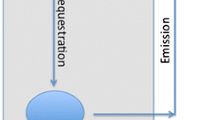Abstract
The necessity of a functional unit, which considers the equality of all benefits, is underlined especially for systems using such natural raw materials as wood.
The example of identifying the ecological optimal extent of paper recycling is therefore examined by using the data of 11ASA [1]. It can be shown that the calculated quantity of the ecological optima particularly depend on the selected model of the comparison. In general, a functional unit of LCA should be based on a model which considers all benefits of the compared systems. The additional benefits of forests have to be taken into account as well. Otherwise, no statement concerning the ecological optima is possible.
Similar content being viewed by others
References
Nilson,Sten;Virtanen,Yrjö; Environmental Impacts of Waste Paper Recycling; Ed.: International Institute for Applied System Analysis (IIASA); Laxenburg (Austria); London: Eathscan Publications Ltd 1993
Deutsches Insritut für Normung: Grundsätze produktbezogener Ökobilanzen - German “Memorandum of Understanding”/ “Conceptual Framework” (Stand Oktober 1993). In: DIN-Mitteilungen + elektronorm 73 (1994), no. 3, pp. 208–212. Berlin, 1994
Fleischer, Günter; Methodik des Vergleichs von Verwertungs- /Entsorgungswegen im Rahmen der Ökobilanz; Abfallwirtschafts Journal 6 (1994), no. 10, pp. 697–701. Neuruppin: EF-Verlag 1994
Fleischer, Günter; Produkt - UVP - Auswahl, Gestaltung und Optimierung umweltfreundlicher Produkte. In:Thomé-Kozmien-Sky, K.J. (Ed.): Abfallverminderung - Duale Abfallwirtschaft und Kompostierung von Bioabfällen; pp. 47–64. Berlin: EF-Verlag für Energie- und Umwelttechnik 1992
Finnveden, Göran; Some comments on the allocation problem and system boundaries in LCA. In: Proceedings of the European Workshop on Allocation in LCA. February 24–25, 1994, pp. 65–73. Brüssel, Leiden: CML 1994
Fleischer, Günter;Ackermann, Robert;Schilling, Roland; Ein Schritt auf dem Weg zur Ökobilanz. In: Abfallwirtschafts Journal 5 (1993), no. 5, pp. 379–396. Neuruppin: EF-Verlag 1993
Schmidt, Wulf-Peter: Life Cycle Assessment zur Bestimmung der ökologisch optimalen Recyclingrate von Papier. Diploma thesis, FG Abfallvermeidung und Sekundärrohstoffwirtschaft of the Technical University of Berlin 1994
Brockhaus-Enzyklopädie in 24 Bänden. F.A. Brockhaus GmbH. Mannheim 1991. Volume 16. pp. 51–52
Society of Environmental Toxicology and Chemistry: Guidelines for Life Cycle Assessment: A ‘Code of Practice’, p. 13
ISO/TC 207/SC5/WG1: Life Cycle Assessment - General Principles & Practices. July 1994
Fleischer, Günter; The allocation of Open-Loop-Recycling in LCA. in: Proceedings of the European Workshop on Allocation in LCA at the Centre of Environmental Science of Leiden University, February 24–25, 1994, pp. 61–63. Brussels, Leiden: CML 1994
Author information
Authors and Affiliations
Rights and permissions
About this article
Cite this article
Fleischer, G., Schmidt, WP. Functional unit for systems using natural raw materials. Int. J. LCA 1, 23–27 (1996). https://doi.org/10.1007/BF02978628
Issue Date:
DOI: https://doi.org/10.1007/BF02978628




